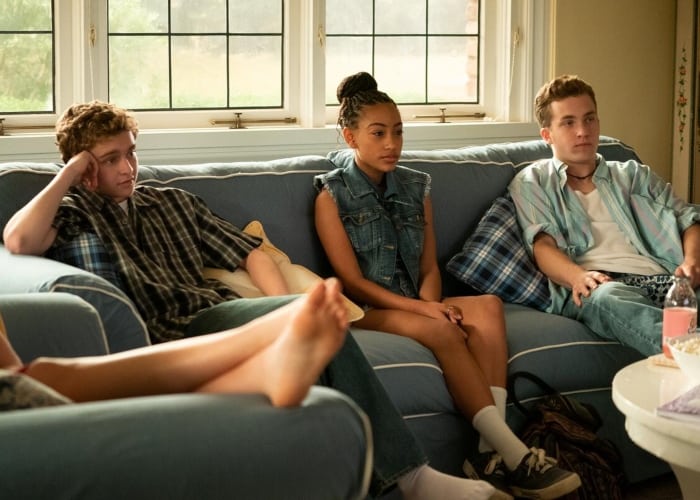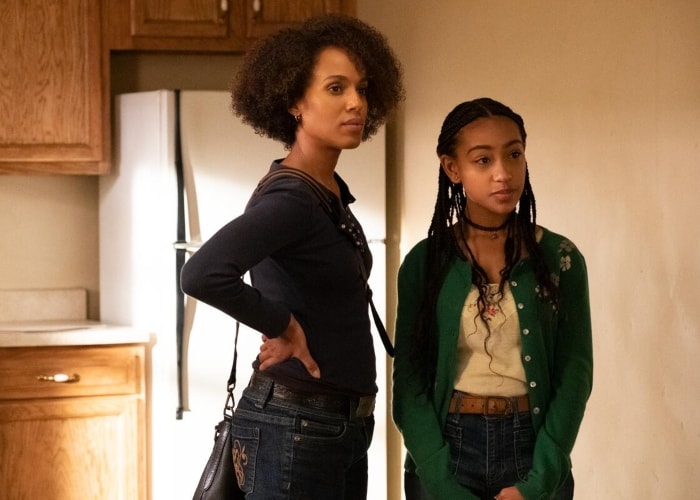If Oscar-bait movies have taught us anything, it’s that some people love uncomplicated takes on race, class, and other intersections of privilege. “We’re more alike than different!” these movies scream, alongside such basic lessons as “stereotypes are untrue” and “good intentions can right any wrong.” The same spoon-fed, simplistic feel-good morals have haunted our screens for decades, ignoring nuanced and evolving cultural conversations to instead deliver the same low-bar lessons again and again.
Little Fires Everywhere is here to call bullshit on all that. Hulu’s latest is a complicated, uneasy, occasionally soapy but always searingly insightful family drama. Based on Celeste Ng’s popular 2017 novel of the same name, the miniseries stars and is co-executive produced by Reese Witherspoon and Kerry Washington. Showrunner Liz Tigelaar (Casual) put together a diverse group of largely female writers to adapt the story about four mothers whose lives are shaped by their social standing, and the result is a prime-time domestic saga that’s engrossing, surprising, and yes, fiery.
Little Fires Everywhere frames its opening scene with a mystery: who burned down the Richardson family’s perfect home? And although it hits some of the same sweet spots as another prestige mystery adaptation featuring Reese Witherspoon, Big Little Lies, this series aims for interpersonal exploration more than whodunit thrills. The flames that lick at the edges of these lives are largely metaphorical.

The miniseries is headed up by two strong performances. In meme terms, Witherspoon’s Elena Richardson is a “Karen,” a white woman whose instinct to speak to the manager is as strong as the cut of her 1997 lady power suit. Elena enthusiastically follows the nonsense rules of her picture-perfect planned neighborhood of Shaker Heights, Ohio, and her favorite pastimes include “helping people” and talking about how she isn’t a racist. She has a nice enough husband (Joshua Jackson), and four kids, each a year apart; popular Trip (Jordan Elsass), geeky-kind Moody (Gavin Lewis), rebellious black sheep Izzy (Megan Stott), and preppy Lexie (Jade Pettyjohn). Elena and Lexie both wear their privilege like a crown, passing out casual microaggressions that at times feel rather macro.
Here’s where Little Fires Everywhere gets interesting: the series affords each of the Petersons, even the worst of them, moments of empathy without ever letting them off the hook for their brattiness and bigotry. Mia Warren (Washington) is the push to Elena’s pull, a single mother who’s both bohemian and broke, and some of the best scenes of the series involve her verbally eviscerating the Petersons, from whom she and her daughter Pearl (Lexi Underwood) are renting a house. Mia doesn’t come away smelling like roses either. Her sense of dignity and righteous fury are excellent, but she also harbors a penchant for making impulsive decisions that don’t take the feelings of others into consideration. Washington and Witherspoon were both perfectly cast and often carry the weight of heavy scenes in their faces alone.
In short, Little Fires Everywhere tells a powerful story of the haves and the have nots while refusing to settle for oversimplified comparisons or hollow allegory. The series makes big points about class and race without ever sacrificing the specificity of its own plot, and it gives us characters to root for and just enough high drama to keep us hooked. The series eventually begins to hinge on a second set of mothers, and while their circumstances are at times too on-the-nose to feel believable, the emotional details of those stories hit hard, too. At its best, Little Fires Everywhere isn’t afraid to lay bare the costs of motherhood for all moms, nor does it shy away from interrogating the important, often-ignored ways in which some are given more choices than others.

Little Fires Everywhere isn’t perfect, but it packs an undeniable punch and excels in little ways that — like the titular fires — make an impact when counted up together. Directors Lynn Shelton, Michael Weaver, and Nzingha Stewart shoot the series with admirable clarity, refusing to give in to the more opaque filmmaking trends of their moody prestige TV contemporaries. The opening credits take the overused idea (see: Game of Thrones, The Crown, Westworld) of a parts-of-a-whole visual motif and make the whole thing riveting by lighting it aflame. Meanwhile, the series’ younger characters deal with serious stories of their own, and the teen actors tackle them with aplomb, especially Underwood and Tiffany Boone, who appears in flashbacks as a young Mia.
Hulu’s latest offering interrogates the world in which its set so well and thoroughly that by the time it gets around to revisiting the burning of the Peterson house at the series’ climax, you might just be happy to watch something so terribly perfect burn.

0 comments:
Post a Comment